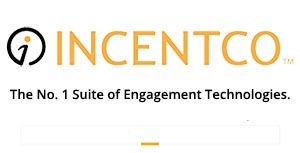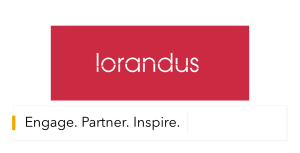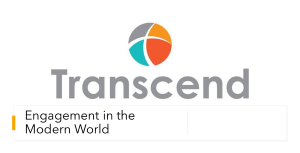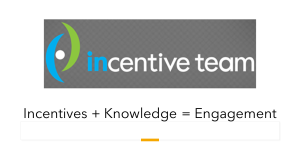Opinion: Yale Business School Webinar Highlights Confusion About Stakeholder Capitalism
By Bruce Bolger
Lack of a Clear Definition
Is Stakecapitalism Catching On?
Challenges Standing in the Way of Progress
In a recent webinar, “Is Stakeholder Capitalism the Future,” Jon Iwata, Practice Leader for the Program on Stakeholder Innovation and Management;
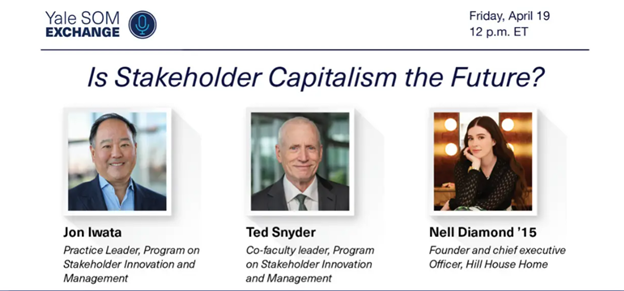 Ted Snyder, Co-Faculty leader, and Nell Diamond, an alumni of the Yale School of Management and Founder and Chief Executive Officer of Hill House Home, demonstrate both the promise of stakeholder capitalism and the confusion that remains about the concept.
Ted Snyder, Co-Faculty leader, and Nell Diamond, an alumni of the Yale School of Management and Founder and Chief Executive Officer of Hill House Home, demonstrate both the promise of stakeholder capitalism and the confusion that remains about the concept. Click here to view the recorded webinar.
According to Iwata, the Stakeholder Innovation and Management program was founded in 2020 based on inquiries from Yale University School of Management alumni about the concept of stakeholder capitalism. See ESM: Yale Introduces Program on Stakeholder Management.
Since then, Iwata says he has conducted over 150 interviews with CEOs on the subject. In addition, the program has created an advisory board of eight former CEOs of leading advertising, financial services, technology, consulting, and travel firms. The Yale program recently held a session for professors from diverse business schools to share views on the subject.
According to Iwata’s engagements with about 150 CEOs, most of them agree that:
- “Long-term financial success is an outcome of a multi-stakeholder approach.
- CEOs need help in determining what societal issues to address.
- Earning a social license to operate is becoming existential to an increasing number of industries.
- CEOs use purpose and values to manage stakeholder relationships and guide strategy—particularly at founding and re-founding moments—but integrating these operations is a challenge.
- Corporations are less adept at measuring non-financial outcomes and assessing their impact on firm performance.
- Creating value for key stakeholders often leads to innovative solutions if new thinking and practices are adopted.”
Lack of a Clear Definition
The webinar began and ended without a clear definition of stakeholder capitalism. Iwata, a former IBM executive, voices what is as close as one could find as a definition during the program: “It's one thing to be committed to the notion that we want to create value for customers and employees, investors, and society and other stakeholders. In practice, it's very difficult to do that. We want to get under the covers of that to understand what would better prepare current and future leaders to be effective at this approach to management.”
Snyder notes that discussions with students about stakeholder capitalism led him to wonder whether it is simply a better form of shareholder capitalism. He notes that there is nothing implicit in the definition of shareholder capitalism that it needs to focus on short-term profits, and that even Milton Friedman left room for a company to define a purpose other than earning short-term profits--if the owners buy into the mission. Snyder wonders whether stakeholder capitalism is simply a modern version of the shareholder model, noting the concept of instrumental shareholder capitalism in which even “profit-oriented owners and managers take into account the values and believes of employees, customers, and others.”
As to the issue of making public statements on social issues sparked by the unrest during the late 2010s, Iwata observes that circumstances forced executives to grapple with the question of when or when not to speak out about social issues. Diamond, the owner of a small, fast-growing apparel company known for its Nap dress, says that as a small company she could speak out on social issues important to her, but questions whether CEOs of large companies with large constituencies would have the latitude to do so.
Snyder, who says he knew Jack Welch, the former and now deceased GE CEO who was the paradigm of shareholder capitalism, explains the shareholder capitalism perspective through his lens. Welch felt that ‘If we make money, then we pay our employees. We pay taxes. We thereby support the community, and we serve our customers, and we return profits to our shareholders. That's our purpose.’” Snyder observes, “I don't think that's necessarily wrong, but I think it's a much more complicated environment today. I think that's where we're going not only with the class, but with the initiative: trying to understand the management techniques that are emerging and seeing how they are implemented.”
Is Stakeholder Capitalism Catching On?
A survey of the webinar attendees indicates a growing interest in stakeholder capitalism but also suggests that the field has a long way to go. Asked which path organizations should follow, shareholder versus stakeholder capitalism, the respondents are 79% in favor of stakeholder capitalism, with 21% preferring shareholder capitalism.
As to which form of capitalism is more prevalent, 61% of the respondents say shareholder capitalism is the prevalent model, while 39% say stakeholder capitalism.
Snyder says he believes that stakeholder capitalism will be the future, “but I’m not sure it’s even the present when I see what’s actually going on today.”
Iwata suggests that companies are most likely to adopt the principles of stakeholder capitalism when they find themselves in an existential crisis or in a period of profound transformation and feel a need not just to rebrand or reposition their companies. Developing a new purpose and values are fine, he adds, “but they are just words unless you integrate them into what you actually do as a business.” Author’s note: see ESM: CEO Profile of CEO Charlie Malouf’s Journey to Stakeholder Capitalism. His company's transformation was indeed spurred by crisis.
Diamond, the apparel entrepreneur, says she believes that stakeholder principles are just as relevant to start-ups as they are to more mature companies. She admits that as a sole founder of a company that didn’t have its first employee for nearly a year, her immediate focus was on getting to profitability rather than writing a formal purpose statement, a task she says she has since completed after various revisions.
She says her company’s focus on the interests of her employees was tested when she hired a highly capable executive whose approach clashed with the culture developed with the company’s original employees, all of whom she says have stayed with the company since joining. “I had to make the very difficult decision to part ways with a highly capable executive because of that lack of fit,” she says.
Challenges Standing in the Way of Progress
The two professors agreed that the political pushback against the concepts of ESG (environmental, social, governance) and stakeholder capitalism has prompted many CEOs to tone down their pronouncements, but Iwata sees no signs that the interest in running an organization based on a transparent purpose and sustainability strategy is going away.
A bigger issue, he believes, relates to implementation. “It may take some kind of new design strategy to identify how to move forward,” he observes. CEOs are asking, “How do you avoid the tyranny of trade-offs. How do you avoid playing a zero-sum game for customers, employees, investors, and so forth?”
Another barrier, Iwata believes, is squishy metrics. “The KPIs (key performance measures) are not standardized yet, they’re soft. So that’s a challenge.” Iwata cites research suggesting that organizations focused on creating value by addressing societal issues reach a peak of efficiency and then face a steep decline in returns if spending too much on such purposes. The goal, he says, is to find a model that extends the upward curve and/or eliminates the downward slope in returns. He questions whether there is an inherent trade-off between profits and “doing good.”
“Yes, you're getting more commitment from your employees. You're getting more buy in from your customers and other stakeholders such as suppliers and partners. That’s the positive part of the curve. We’re trying through case studies to find out how to flatten the curve.”
Authors’ observations. From the perspective of those who have promoted stakeholder management principles for decades, the new program at Yale is exciting because of the validation it offers to the field.
Definitions matter: there remains no formal definition in any dictionary, without which any discussion is difficult. Based on an analysis of over 100 academic studies on stakeholder management, the application of its principles in total quality management, and on input from Alex Edmans, Professor of Finance at London Business School, and Martin Whittaker, CEO of JUST Capital, the Enterprise Engagement Alliance’s 2020 definition was published in Forbes: “Enhancing returns for investors only by creating value for customers, employees, supply chain and distribution partners, and communities.” None of the early advocates we are aware of conflated stakeholder capitalism with corporate social responsibility until the Business Roundtable issued its 2019 pronouncement on the need to address the interests of all stakeholders, and the 2020 Davos Conference and 2020 Larry Fink letter to BlackRock investors made illusion to the concept at the same time racial tensions were flaring in the US. Click here for a complete library of information on stakeholder capitalism.
Purpose helps determine and explain tradeoffs. R. Edward Freeman, Professor of Business Administration at Darden School of Business at the University of Virginia, who is widely credited to being one of the founders of the stakeholder capitalism vision, argues that stakeholder capitalism in fact makes it easier for CEOs to make tough decisions, because it involves harmonizing the interests of all stakeholders, including investors, in support of a transparent, common purpose, goals, and objectives and values. Freeman notes that the concept of stakeholder management and theory are taught in many business schools but are not commonly integrated into the education program for management in leadership, finance, human resources, marketing, sales, operations, etc., helping to reinforce the siloes standing in the way of greater harmony of management processes. He has told ESM that he doesn't see the need for a formal definition, arguing that there are many approaches to harmonizing the interests of stakeholders. As to managing tough decisions affecting people, adhering to a transparent purpose and principles does not eliminate the need for trade-offs, but makes them easier to explain to the stakeholders involved.
A focus in creating value rather than extracting profits and offloading costs. However it's formally defined, organizations focusing on value creation for all stakeholders do not offload costs on to society by underpaying employees or having them work in unsafe situations; trying to deceive customers or by skimping on quality products and service; squeezing supply chain and distribution partners, or by polluting communities and the environment. They focus on creating value for stakeholders.
On CEOs making political statements: don't. Leo E. Strine Jr., the former Delaware Supreme Court Justice widely credited with promoting the establishment of lpublic benefits corporations, strenuously urges CEOs to stay out of politics unless the issues are directly related to the purpose, goals, objectives, and values of an organization and transparently explained to all stakeholders. On that basis, philanthropic or other social investments are guided by the organization's own purpose, goals, objectives, and values, not by the ad hoc discretion of the CEO or management.
The experience in total quality management. The program’s managers also did not appear aware of or made no reference to the well-established work of W. Edwards Deming, the aforementioned R. Edward Freeman, the management consultant Peter Drucker, or the field of total quality management and ISO (International Organization for Standardization) Annex SL standards, all of which address issues related to stakeholder management. Other examples are the Conscious Capitalism, B Corps, Shared Values, Economics of Mutuality frameworks or the Enterprise Engagement implementation system modeled on total quality management. All these systems can arguably flatten the curve referred to by Iwata simply by aligning people investments with the organization's purpose, goals, and objectives, rather than unrelated social or environmental issues.
There's room for diverse implementation approaches. Supporting Freeman’s assertion that there can be many models, all the various approaches include a formal operating system and metrics based on harmonizing the interests of all stakeholders on a clear purpose, goals, objectives, and values, so that there is a transparent framework against which difficult decisions are made and explained. On the issue of metrics, the session did not include mention of the Irrational Capital model for measuring the financial impact of employee engagement or the significant work already accomplished on the relationship between human capital and financial performance). There was no mention in the program of the European Union Corporate Sustainability Reporting Directive, which includes dozens of specific human capital disclosure metrics considered material to organizational performance, including the concept of double-materiality--the opportunities and risks that organizations create for all stakeholders and the environment, and vice versa.
ESM Is Published by The EEA: Your Source for Effective Stakeholder Management, Engagement, and Reporting
Through education, media, business development, advisory services, and outreach, the Enterprise Engagement Alliance supports professionals, educators, organizations, asset managers, investors, and engagement solution providers seeking a competitive advantage by profiting from a strategic and systematic approach to stakeholder engagement across the enterprise. Click here for details on all EEA and ESM media services.
1. Professional Education on Stakeholder Management and Total Rewards
- Become part of the EEA as an individual, corporation, or solution provider to gain access to valuable learning, thought leadership, and marketing resources to master stakeholder management and reporting.
- The only education and certification program focusing on Stakeholder Engagement and Human Capital metrics and reporting, featuring nine members-only training videos that provide preparation for certification in Enterprise Engagement.
- EEA books: Paid EEA participants receive Enterprise Engagement for CEOs: The Little Blue Book for People-Centric Capitalists, a quick implementation guide for CEOs; Enterprise Engagement: The Roadmap 5th Edition implementation guide; a comprehensive textbook for practitioners, academics, and students, plus four books on theory and implementation from leaders in Stakeholder Management, Finance, Human Capital Management, and Culture.
2. Media
- ESM at EnterpriseEngagement.org, EEXAdvisors.com marketplace, ESM e–newsletters, and library.
- RRN at RewardsRecognitionNetwork.com; BrandMediaCoalition.com marketplace, RRN e-newsletters, and library.
- EEA YouTube Channel with over three dozen how-to and insight videos and growing with nearly 100 expert guests.
3. Fully Integrated Business Development for Engagement and Total Rewards
Strategic Business Development for Stakeholder Management and Total Rewards solution providers, including Integrated blog, social media, and e-newsletter campaigns managed by content marketing experts.
4. Advisory Services for Organizations
Stakeholder Management Business Plans; Human Capital Management, Metrics, and Corporate Sustainability Reporting for organizations, including ISO human capital certifications, and services for solution providers.
5. Outreach in the US and Around the World on Stakeholder Management and Total Rewards
The EEA promotes a strategic approach to people management and total rewards through its e-newsletters, web sites, and social media reaching 20,000 professionals a month and through other activities, such as:
- Association of National Advertisers Brand Engagement 360 Knowledge Center to educate brands and agencies.







